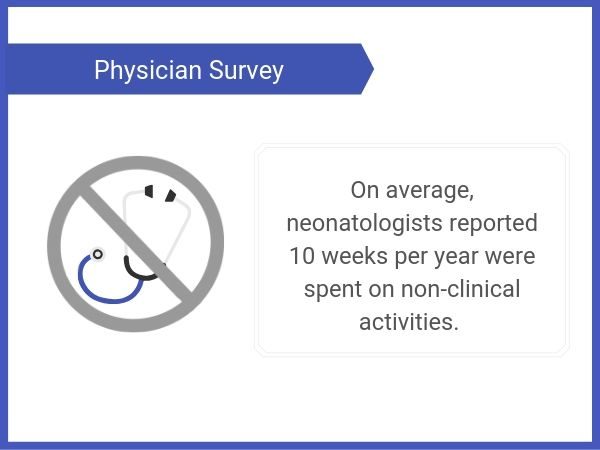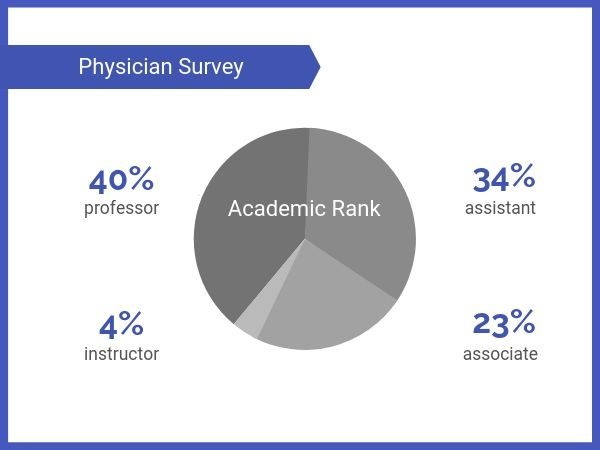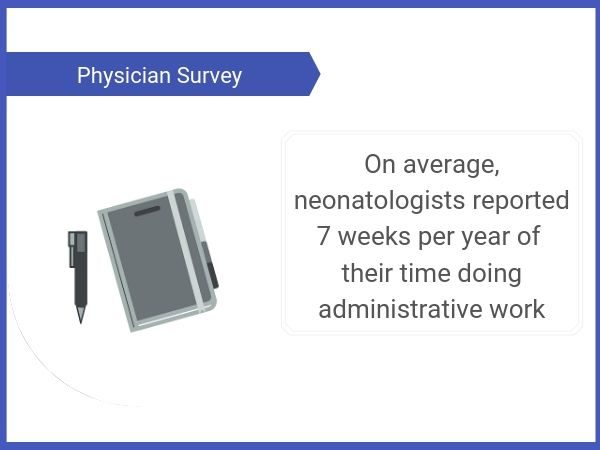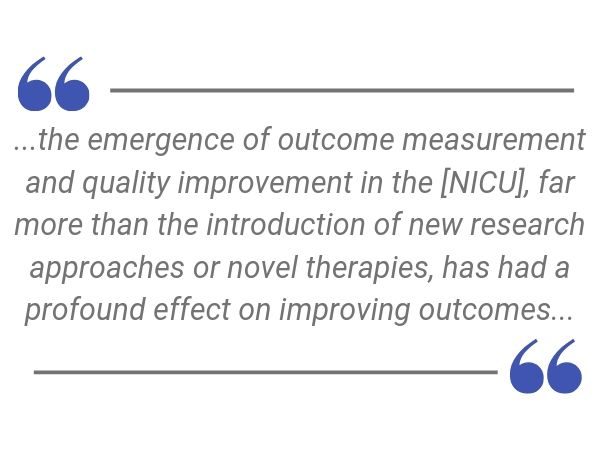Career Planning
|
Defining the Ideal Position
Consider Other Professional Interests
The job of neonatology requires more than just the hands-on care at the bedside. You should consider the non-clinical duties and activities as you determine your own professional interests.
Exploring various career pathways and professional duties from the perspective of others may be a very helpful way to learn more about what opportunities you might find interesting for your own career.

The job of neonatology requires more than just the hands-on care at the bedside. You should consider the non-clinical duties and activities as you determine your own professional interests.
Exploring various career pathways and professional duties from the perspective of others may be a very helpful way to learn more about what opportunities you might find interesting for your own career.



A recent 2019 study by Horowitz, Feldman, and Savich published in the Journal of Perinatology provided some excellent insights into various aspects of neonatology time commitment, distribution of duties, compensation, and impacts of geographic location and gender.
The study’s sample size of 366 neonatologist respondents, two-thirds of whom worked in academic settings, represents only 9% of the total US American Board of Pediatrics Neonatal-Perinatal Medicine Delegates (4078 in 2015-2016) and therefore interpretation of these results should be done with caution.
Nonetheless the results highlight some very interesting findings of the practice aspects of the respondents. All graphics below represent data pulled from the Horowitz study.
Review the data and questions below as you consider how to incorporate non-clinical interests into your career plans.
Time Beyond Patient Care
As you consider this topic for your own career planning, it may be helpful to know how time is typically spent away from the bedside in general.


These other activities included doing research, administrative tasks, or continuing education.
Focusing on these aspects of our profession, and whether or not you enjoy them, can be helpful in determining the right practice options for your career path.
- Do you want to focus on clinical care only?
- Do you eventually hope to seek out related responsibilites beyond patient care?
- Do you want a career that includes a non-clinical role, such as a directorship, for which you will be paid?
- Do you want to spend less time in clinical practice?
- Are you okay with tasks that take you away from patient care?
- What types of non-patient care activities do you currently enjoy?
- Which non-clinical activities do you least enjoy?
Teaching
Teaching can be a fulfilling way of sharing your knowledge and experience to further impact the abilities of others. Many feel that teaching is the best way to ensure that one’s knowledge and skills stay relevant and up to date.
Horowitz reported the following breakdown of neonatologists practicing in an academic program.


Beyond academic teaching institutions, there are many opportunities for not just medical student, resident, and fellow teaching, but also nurse practitioners, nurses, therapists, and even families.
An academic track is not the only path for you to incorporate teaching into your neonatology career, especially if you enjoy the idea of teaching but not necessarily all the other aspects that come with practicing in an academic program.
- Do you enjoy teaching others?
- Do you see teaching as a fulfilling aspect of your career?
- Are you interested in mentoring others?
- Is teaching the next generation of providers an exciting career path?
- How much time would you want to spend teaching others?
Research
While most research opportunities will be found in academic medical centers, opportunities do exist in other settings as well. More and more Phase II and III clinical trials are being pursued in regional medical centers or community hospitals without a formal academic designation. In some cases, the patient population may be more homogeneous and less acute, and the influence of trainee-induced variability may be less, making for ideal study conditions. The challenge in these settings, however, is often that they lack robust research infrastructure and clinical research nursing support.
Regardless of setting, keep in mind that contributing to the fund of knowledge of our field and exploring new and better ways to care for our babies and improve their outcomes can be an incredibly fulfilling aspect of one’s career.
-
-
- Do you enjoy the intellectual challenge of academic medicine?
- Are you interested in a research-focused academic career?
- Do you want to publish articles?
- Is it important to achieve national recognition as an academic expert?
- Do you want to focus on a particular area of neonatal-perinatal medicine?
- Is there an area of particular interest you have for continued investigation?
- Is there a particular area you would like to specialize in your career?
-
Leadership
You’re already a leader by virtue of being a physician and neonatologist. But the opportunity for formal leadership responsiblities and titles can be rewarding and can provide the satisfaction of demonstrating a positive impact on a larger scale.
If you are interested in pursuing a leadership role, you may wish to seek guidance on how to develop physician leadership competencies as a component of your career planning and professional development.
The American Association for Physician Leadership offers several resources, formal courses, and certifications to help physicians become even more effective leaders.
- Are you interested in any leadership roles?
- If so, what titles do they include?
- Does hospital administration sound interesting?
- How about Medical Director of Transport? Associate Director of NICU Follow Up?
- Would you like to influence change or make decisions for a group?
- Do you have an interest in developing annual goals or strategies for a practice?
- Are you interested in pushing your practice or group to the next level?
Administration
Many health care systems recognize the importance of having clinicians in key administrative positions throughout the organization.
Additional training is often beneficial, and opportunities abound for masters-level training that can provide business-focused skills not commonly included in our medical training.
Horowitz provided some insight into how many weeks per year neonatologist respondents spent doing administrative time. Neonatologists reported 7 weeks on average per year of administrative time.
Most of the respondents, however, were not in formal administrative roles, which can often consume the bulk of one’s work, and in some cases may require leaving the bedside entirely. Remember that some of this “busywork” is to be expected in any neonatologist’s role, whether or not a title comes with it.


- Are there certain councils or committees you would like to be involved in?
- Do you enjoy department-level decision making?
- Do you want to affect change on a larger scale?
- Are you interested in developing and implementing policies or programs?
- Are you skilled at engaging with administrative or executive level titles?
- Are you okay with attending meetings? Maybe lots of meetings??
Clinical Quality
Quality improvement is now a necessity and expectation in our field, and for good reason. While the whole team is critical in the success of QI initiatives, good team leadership to drive quality initiatives is a skill that will make the process smoother and the outcomes better.
You may be interested in analyzing data, reviewing evidence, and facilitating the adoption of clinical guidelines to appropriately standardize practice, which are all important aspects of our professional duties as practicing neonatologists.


Spitzer, AR. Clinical Perinatology, 2017.
- Are you interested in monitoring and improving patient outcomes?
- Do you have an interest in quality improvement programs?
- Do you enjoy working with data and using data to improve outcomes?
- Do you enjoy reading literature and learning about advancements in practice?
- Do you want to push for more standardized practice to reduce variation in care?
- Do you have particular statistical expertise or knowledge of managing databases that could be leveraged?
Advocacy
As busy clinicians, we are often required to react to forces seemingly beyond our control, rather than proactively crafting policy that improves the lives of our patients, families, and ourselves as providers caring for them.
Our voices as pediatric experts are powerful. Strong pediatric advocacy can make some of the most profound changes possible and can have impacts around the world. The American Academy of Pediatrics is one of the most powerful pediatric advocates on the globe, and has a wealth of resources for the clinician who wants exert influence through policymaking.
- Are you interested in shaping healthcare policy?
- Are there certain issues for which you would like to advocate for change?
- Do you have an interest in participating in professional organizations?
- Would you want to advocate on behalf of patients and families?
- Do you want to work with neonatologists, pediatricians, or other clinicians across the country or within a region?
- Do you enjoy engaging in the legal and/or political process?
Additional Resources
A resource offered by Physician Career Planning to provide an overview, ideas, and perspectives on non-clinical careers for physicians.
MD Magazine provides a list and overview of the best jobs for physicians outside of the clinical setting.
MD Magazine provides a list and overview of key considerations for physicians interested in seeking a non-clinical job.
The Blueprint for Children was published in advance of Election Day 2020 and recommends policies to promote healthy children, support secure families, build strong communities, and reclaim America’s role as a leading nation for youth.


